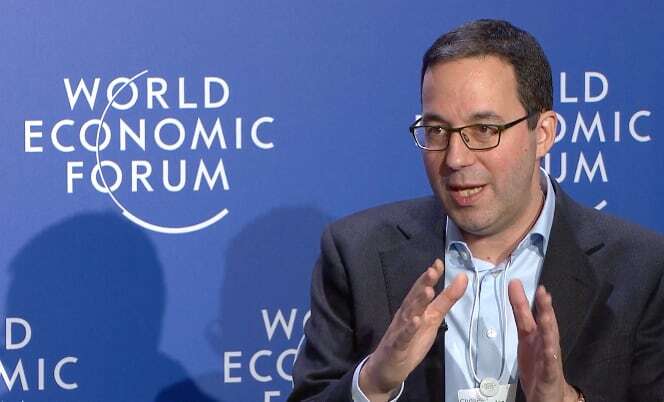As the World Economic Forum’s (WEF) Alliance of CEO Climate Leaders, which now includes 127 “seriously committed” executives from some of the world’s largest companies, continues to make progress, Christian Mumenthaler, CEO of reinsurance giant Swiss Re, is seeing the tipping point.
 The WEF Alliance is a CEO-led community dedicated to raising bold climate ambition and accelerating the net zero transition. It seeks to do this by setting science-based targets, disclosing emissions, and driving decarbonisation and partnerships across value chains.
The WEF Alliance is a CEO-led community dedicated to raising bold climate ambition and accelerating the net zero transition. It seeks to do this by setting science-based targets, disclosing emissions, and driving decarbonisation and partnerships across value chains.
Speaking this morning on a panel at the WEF 2023 annual meeting in Davos, Mumenthaler, a strong advocate of the transition to net zero both in the re/insurance industry and beyond, discussed the progress of the WEF Alliance.
“We have 127 CEOs, and it’s the toughest criteria to be in,” said Mumenthaler. “So, you need to be net zero by 2050, you need to report, and you need to be STBi (the Science Based Targets initiative) compatible, where SBTi has traced a path. So, these are very committed CEOs, and the Scope 1, 2, and 3 footprint of them together will be the third largest country in the world.”
So, these are large, important, and influential companies.
As a reminder, greenhouse gas emissions are split into three categories for businesses and organisations: Scope 1 – these are direct emissions; Scope 2 – these are indirect emissions; and Scope 3 – these are also indirect emissions but differ from Scope 2 as they cover those produced by customers using the company’s products / those produced by suppliers making products that the company uses.
Between 2019 and 2020, explained Mumenthaler, the progress of the companies in the Alliance was measured, showing that for Scope 1 and 2, there was a 22% reduction, which he feels “is really good.”
However, while members of the Alliance have made solid progress within their own companies, it’s already patchier when it comes to Scope 2, said the Swiss Re CEO, while Scope 3 is where the work has only recently begun.
“Scope 3 is really where we have a huge leverage, because these 127 companies probably have 100,000 suppliers and they need to send the price signal out to these suppliers that they have to be net zero, otherwise we can’t be net zero, and that’s the tipping point.
“I’m seeing the tipping point, and that makes me modestly encouraged about the path we’re taking because it’s very different dynamics now. There’s going to be massive price signals going out, signals from big corporations that if you want to be in the value chain, you need to act,” said Mumenthaler.
For Swiss Re, like many other companies, Mumenthaler explained that Scope 1 and 2 account for just 5% of the firm’s total footprint, so the vast majority is Scope 3 – upstream and downstream – which for Swiss Re is downstream, meaning all of its investments.
To address this, the reinsurer is also a member of the Net-Zero Asset Owner Alliance, which is designed to promote responsible investment practices that can help to fight climate change by limiting the rise in global temperature to no more than 1.5°C warming.
Launched in 2019 with 12 companies, the Alliance provides members with measurements to reduce the carbon footprint of every investment.
“And once you have that, you can actually reduce it any pace because you divest, basically, which is not something we prefer because we want to influence the companies. We have hundreds of discussions with companies over the year on how to encourage them on their path to net zero. On the asset side, I think, it is feasible,” said Mumenthaler.
On the underwriting side, which is Swiss Re’s core business, there’s no measurements as the SBTi are yet to come up with anything.
This contributed to the creation of the UN-convened Net-Zero Insurance Alliance (NZIA), a group of over 29 leading insurers representing more than 14% of world premium volume globally, committed to transition their insurance and reinsurance underwriting portfolios to net zero by 2050.
Mumenthaler noted that while the work is really difficult, at Davos this year, NZIA now has measurements, which ultimately enables things to get done.
“So, I’m quite optimistic for the insurance industry because there’s about 20 companies participating, and they will start to have signals on the insurance and reinsurance side in the industry,” said Mumenthaler.


